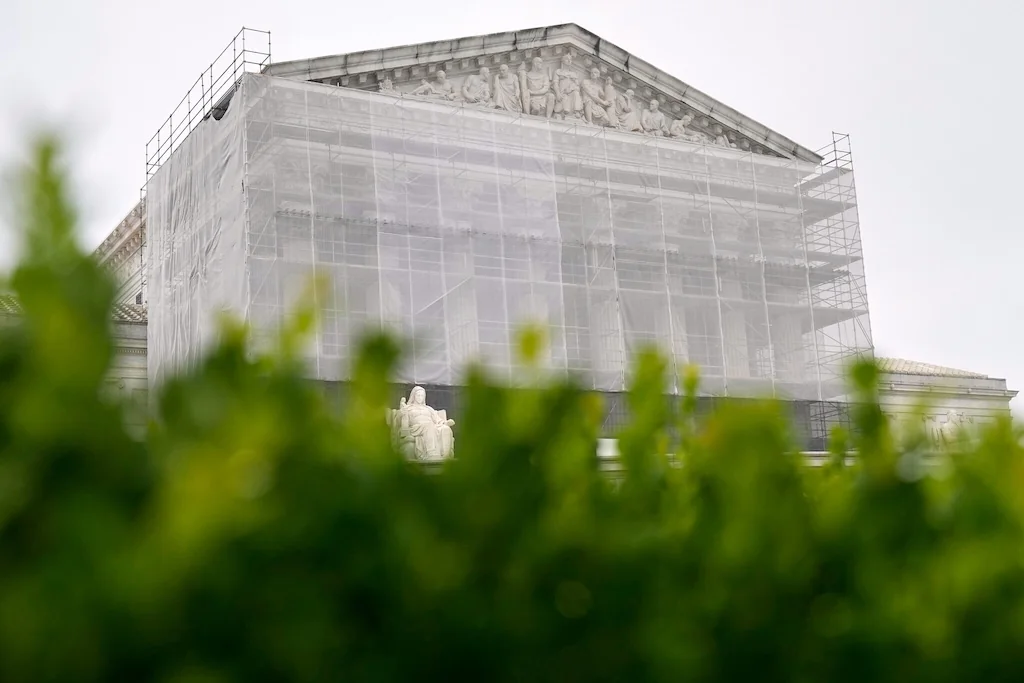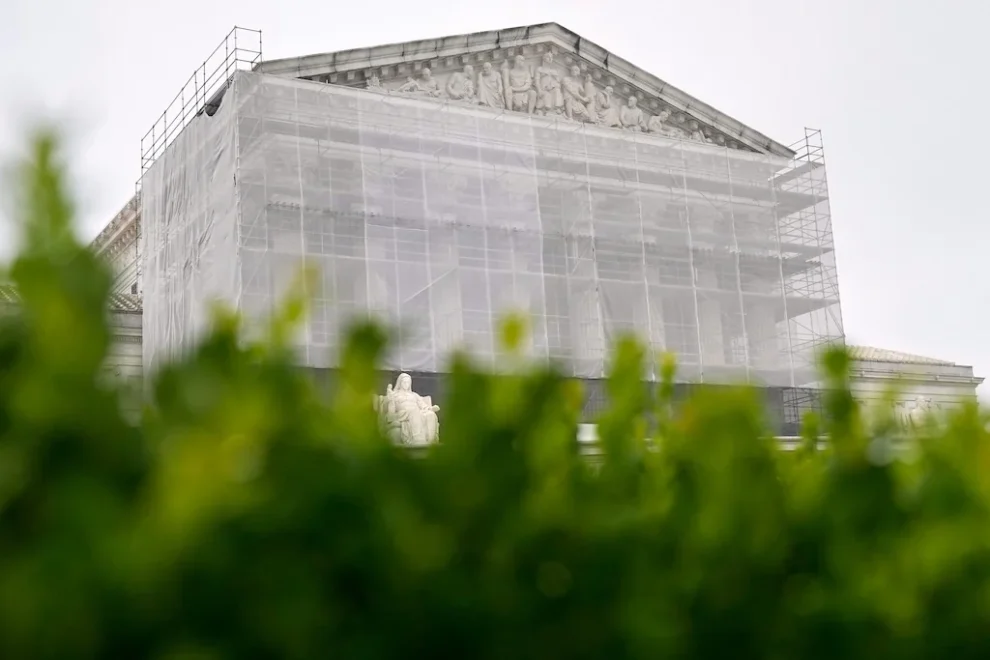The Supreme Court on Friday limited the power of federal judges to issue nationwide injunctions, handing President Donald Trump a partial victory in his legal battle to implement a controversial executive order ending birthright citizenship.
In a 6-3 opinion authored by Justice Amy Coney Barrett, the majority ruled that the district courts exceeded their power by issuing sweeping universal injunctions. The case was not argued on the merits of the birthright citizenship order, meaning this ruling does not directly resolve the underlying 14th Amendment dispute raised by Democratic-led state plaintiffs and noncitizen parents.
“Federal courts do not exercise general oversight of the Executive Branch; they resolve cases and controversies consistent with the authority Congress has given them,” Barrett wrote for the majority.” When a court concludes that the Executive Branch has acted unlawfully, the answer is not for the court to exceed its power, too.”

The majority partially blocked the preliminary injunctions, restricting them to only the parties suing the Trump administration.
“The Government’s applications to partially stay the preliminary injunctions are granted, but only to the extent that the injunctions are broader than necessary to provide complete relief to each plaintiff with standing to sue,” Barrett wrote “The lower courts shall move expeditiously to ensure that, with respect to each plaintiff, the injunctions comport with this rule and otherwise comply with principles of equity.”
Barrett wrote in her opinion that universal injunctions are relatively new from district courts, rejecting arguments that the sweeping actions are deeply rooted in the judicial history of the country.
“The universal injunction was conspicuously nonexistent for most of our Nation’s history,” Barrett wrote. “Its absence from 18th- and 19th-century equity practice settles the question of judicial authority. That the absence continued into the 20th century renders any claim of historical pedigree still more implausible.”
“Had federal courts believed themselves to possess the tool, surely they would not
have let it lay idle,” she added.
Barrett also took particularly aggressive aim at Justice Ketanji Brown Jackson’s dissent, rejecting Jackson’s claims that lower courts do not have limits on their power to issue sweeping injunctive relief.
“We will not dwell on Justice Jackson’s argument, which is at odds with more than two centuries’ worth of precedent, not to mention the Constitution itself,” Barrett wrote. “We observe only this: Justice Jackson decries an imperial Executive while embracing an imperial Judiciary.”
“No one disputes that the Executive has a duty to follow the law,” Barrett added. “But the Judiciary does not have unbridled authority to enforce this obligation—in fact, sometimes the law prohibits the Judiciary from doing so.”
Chief Justice John Roberts and Justices Clarence Thomas, Samuel Alito, Neil Gorsuch, and Brett Kavanaugh joined the majority opinion. Thomas, Alito, and Kavanaugh each filed their own concurring opinions.
Justice Sonia Sotomayor wrote a scathing dissent, joined by Justice Elena Kagan and Jackson, who also wrote her own dissent. In Sotomayor’s dissent, she criticized the Trump executive order at the center of the universal injunctions and raised the alarm over the high court’s limits on injunctions.
“No right is safe in the new legal regime the Court creates,” Sotomayor wrote. “Today, the threat is to birthright citizenship. Tomorrow, a different administration may try to seize firearms from lawabiding citizens or prevent people of certain faiths from gathering to worship. The majority holds that, absent cumbersome class-action litigation, courts cannot completely enjoin even such plainly unlawful policies unless doing so is necessary to afford the formal parties complete relief.”
“That holding renders constitutional guarantees meaningful in name only for any individuals who are not parties to a lawsuit,” Sotomayor added. “Because I will not be complicit in so grave an attack on our system of law, I dissent.”
The decision in Trump v. CASA arrives amid a mounting legal standoff over Trump’s second-term use of executive power. Federal courts issued at least 25 nationwide injunctions, also known as universal injunctions, against Trump administration policies between Jan. 20 and late April, blocking policies ranging from immigration enforcement to education reforms. Six months into Trump’s second term, judges have issued more nationwide injunctions than they issued during the entire eight-year Obama administration.
Trump’s legal team has described the trend as an “epidemic” of judicial overreach that has paralyzed the president’s executive authority.
Although the case began as a challenge to Trump’s order denying birthright citizenship to U.S.-born children of illegal immigrants or temporary visa holders, the justices focused their May 15 oral arguments almost entirely on the legality and reach of the court orders blocking it.
Legal experts on both sides viewed the case as a critical test of whether a single federal judge can block a presidential order from taking effect nationwide — a tactic often used by opponents of both Trump and former President Joe Biden.
Trump’s then-Acting Solicitor General Sarah Harris urged the justices to “declare that enough is enough” and restrict available relief to the actual plaintiffs in each case, rather than allowing unelected judges to “veto” policies effectively across all 50 states.
Nationwide injunctions were virtually nonexistent before the 1960s but have surged in use, in part due to the influx of presidents issuing more and more executive orders with each passing presidency. Just six were issued during former President George W. Bush’s presidency, 12 under former President Barack Obama, and 64 during Trump’s first term, according to the Capitol Research Center.
Trump allies have argued that the broad powers district court judges have to impose nationwide injunctions encourage litigants to engage in judge-shopping, which occurs when they seek out venues with judges who are potentially sympathetic to their causes, to undermine uniform application of federal law.
Justice Neil Gorsuch, in a 2020 concurrence, warned that “a single successful challenge can stop a policy cold.”
Still, not all justices appeared ready during oral arguments last month to curtail lower courts’ abilities to impose nationwide injunctions.
Kagan and Barrett, who are typically on opposite ends of the ideological spectrum, expressed concern during arguments that limiting injunctive relief could allow potentially unconstitutional policies to stay in place for months or years, particularly when acting quickly may be critical.
SUPREME COURT MAKES TRUMP WAIT ON KEY DECISIONS
The underlying merits dispute in the CASA case centers on whether the 14th Amendment guarantees citizenship to anyone born on U.S. soil. The plaintiffs argue it does, while the Trump administration contends that children of two noncitizen parents are not “subject to the jurisdiction thereof,” the key phrase in the Constitution that the Trump administration would like to interpret differently.
Although the justices did not weigh in on the merits of the 14th Amendment claims in this case, they are likely to take up the issue in the near future. At least four federal district courts have rejected the Trump administration’s interpretation of birthright citizenship, and three federal appeals courts have upheld those rulings.
























